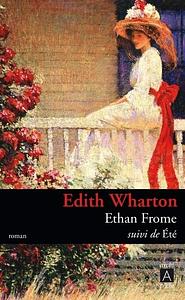Take a photo of a barcode or cover
emotional
reflective
sad
fast-paced
Plot or Character Driven:
A mix
Strong character development:
Yes
Loveable characters:
Complicated
Diverse cast of characters:
No
Flaws of characters a main focus:
Yes
A sad, sad story about a handful of morally gray characters
Ethan Frome is a novella by Edith Wharton set in a brutally cold New England winter. It explores the dynamics of a tragic love triangle between the titular character, his ill wife, and his wife’s young, beautiful cousin, who serves as a maid in their home. Despite being 114 years old, the story remains strikingly effective in its psychological depth, cutting deep into the reader’s emotions. For such a short work—truly a novella—there’s an impressive amount to unpack. However, I want to focus on what I find most compelling: the moral ambiguity of Ethan’s actions.
On the surface, Ethan is clearly at fault for emotionally cheating on his wife. But Wharton slyly suggests that Zeena, his wife, is manipulative, using her illness—real or feigned—as a tool to control Ethan and remove Mattie, whom she perceives as a romantic threat. Still, Zeena’s illness, if it is not real, may be a symptom of her desperate, doomed love for her husband. This additional layer of sentiment stabs at the reader’s heart as the pendulum of judgment swings toward and away from Ethan. Even more still, I began to suspect that Mattie might also be manipulating Ethan. Her seemingly pure and innocent demeanor—the “good girl” façade—may not be entirely sincere, especially as her love for Ethan intensifies.
At the heart of the story is a tragic inevitability. Ethan has no good choices. He can remain in his bleak but stable existence, bound to Zeena, or he can chase an uncertain, idealized romance with Mattie—one that would require abandoning his home, his resources, and his community. More than that, leaving would mean effectively condemning Zeena to death, at least based on his understanding of her illness. And yet, the story’s devastating irony is that Zeena’s illness may have been exaggerated or entirely false, while Mattie, in the wake of their failed suicide pact, becomes permanently paralyzed. In the end, the roles reverse—Zeena, once the frail and sickly wife, becomes Mattie’s caretaker, and Ethan finds himself trapped with both of them, caught in an inescapable purgatory.
The ending is especially powerful in illustrating that whether one pursues forbidden desires, as Ethan and Mattie do in their reckless escape attempt, or adheres to societal expectations, suffering is inevitable. Fate, it seems, punishes either path. Even for someone as unassuming as Ethan, simply trying to navigate his existence within or outside of society’s moral expectations leads to a kind of personal hell. I don’t know if Wharton intended such a deeply cynical reading, but it’s hard to ignore how disproportionately Ethan is punished for a crime that, while morally wrong, hardly seems to warrant the lifelong misery he endures.
dark
emotional
sad
medium-paced
Plot or Character Driven:
Character
Strong character development:
No
Loveable characters:
Complicated
Diverse cast of characters:
No
Flaws of characters a main focus:
Complicated
dark
slow-paced
Plot or Character Driven:
Character
Strong character development:
No
Loveable characters:
No
Diverse cast of characters:
No
Flaws of characters a main focus:
Yes
I love Edith Wharton. Her books always suck me right in, and even when the stories are tragic or sad or horrifying, I always finish them and feel satisfied. I love how she manages to keep her story arcs focused regardless of the length of her works.
So, what did I think of Ethan Frome? I really liked it. There was such great frustration painted, both through Ethan himself--his frustrated dreams, his wife, his passion and then great love for Mattie--and through the women he lives with. You could really sense that Ethan wanted better than what he was stuck with, but didn't know how to curb his impulsivity--which came into play at the end of the book.
I also loved the balance between Ethan and Mattie. I loved how he was so introverted and taciturn, and she was effervescent and chatty. They're the kind of opposites that often find each other in literature, like Elizabeth and Mr. Darcy, or Jane and Rochester. He's capable of hard work, but has no ability to form connections because of his half-finished education and his quiet nature. Mattie can't focus long enough to work, but she's more than capable of making friends, and her influence could have been so helpful to Ethan.
And finally, I found Zeena interesting, too. She seemed at first glance to be the kind of woman who, like Mattie, has no ability to provide for herself, but instead of latching onto her relations, she caught herself a husband. But Zeena is more complex than that, too, and I think that's a big part of why I liked her. It's not that Zeena isn't capable of fending on her own, it's that she doesn't want to. She wants to feel loved, and she first found that while caring for Ethan's mother. After she married Ethan, though, he stopped needing her in the same way, and she tried to recreate that for herself. I actually wonder if Zeena has Munchhausen's? Because it seems to me that she invents or creates symptoms in order to elicit pity and "love" from her neighbors and husband. But then by the end of the book, she's found a way to be useful again.
Overall I found it a really interesting look at what was valued in women at the time, and at how different women responded differently to the pressures and expectations put on them by men.
So, what did I think of Ethan Frome? I really liked it. There was such great frustration painted, both through Ethan himself--his frustrated dreams, his wife, his passion and then great love for Mattie--and through the women he lives with. You could really sense that Ethan wanted better than what he was stuck with, but didn't know how to curb his impulsivity--which came into play at the end of the book.
I also loved the balance between Ethan and Mattie. I loved how he was so introverted and taciturn, and she was effervescent and chatty. They're the kind of opposites that often find each other in literature, like Elizabeth and Mr. Darcy, or Jane and Rochester. He's capable of hard work, but has no ability to form connections because of his half-finished education and his quiet nature. Mattie can't focus long enough to work, but she's more than capable of making friends, and her influence could have been so helpful to Ethan.
And finally, I found Zeena interesting, too. She seemed at first glance to be the kind of woman who, like Mattie, has no ability to provide for herself, but instead of latching onto her relations, she caught herself a husband. But Zeena is more complex than that, too, and I think that's a big part of why I liked her. It's not that Zeena isn't capable of fending on her own, it's that she doesn't want to. She wants to feel loved, and she first found that while caring for Ethan's mother. After she married Ethan, though, he stopped needing her in the same way, and she tried to recreate that for herself. I actually wonder if Zeena has Munchhausen's? Because it seems to me that she invents or creates symptoms in order to elicit pity and "love" from her neighbors and husband. But then by the end of the book, she's found a way to be useful again.
Overall I found it a really interesting look at what was valued in women at the time, and at how different women responded differently to the pressures and expectations put on them by men.
This haunting novella doesn't really tell you what its moral are or provide a moral lesson. The plot just sits like an elephant on your chest and makes you listen in horror as the tale goes on. It's a heartbreaking story and Wharton does an amazing job of making her reader look at the characters from the point of class and gender. The women are made to be dependent due to their gender; Zeena and others harp that Mattie doesn't have anywhere else to go, but if she were married, she would. Ethan imparts on Mattie that she needs him to survive and she, of course believes it. Zeena is also dependent on Ethan. Without Ethan, she wouldn't have the means to go to the doctor and take care of herself. When Ethan and Mattie commit their final "Romeo and Juliet" act and do not die, Zeena must take care of the two, meaning that she cannot ever be well as the doctor from the next town over said that she must be bedridden and have everything done for her.
Wharton understands what it means to have money and what it means to be a woman in American society in the early 20th century. "Ethan Frome" makes that more obvious to me than ever.
Wharton understands what it means to have money and what it means to be a woman in American society in the early 20th century. "Ethan Frome" makes that more obvious to me than ever.
I tend to live in a book-centered world so when I learn of a book or author that intrigues me, I immediately conduct a search and start tagging away for future reading. I’m confident that is exactly how some of Edith Wharton’s novels ended up on my tagged list for my local library. I am new to her writing and wasn’t sure where to begin. I read that Ethan Frome is a reader favorite and it was only a four hour audiobook commitment. I decided this selection was a good place to start.
Immediately, I liked how the audiobook offered an introduction to Edith Wharton with a brief summary of her life and popular works. Ethan Frome is a poor man struggling to keep his family farm and mill operating. His wife, Zeena, is rather unpleasant and a hypochondriac. Her cousin, Mattie, comes to live with Ethan and Zeena to help with the farm and chores around the house due to Zeena’s illness. Mattie is a ray of sunshine to Ethan’s dreary life. As readers would expect, the two fall in love and are determined to be together. The story becomes climatic when the forces of them trying to be together are met with the forces determined to keep them apart. It’s a mesmerizing story with an unexpected ending.
I truly enjoyed this novella by Wharton and look forward to reading more of her work. My book tribe has advised me that her other books are quite different from this one concerning setting. I liked her writing style: her descriptions of scenes and ability to weave an interesting, timeless tale. I predict I will love her work regardless of setting.
I borrowed Ethan Frome in audiobook format from my local library through the Libby app. I absolutely loved the narration by Scott Brick! He is one of my favorite narrators.
I have photos and additional information that I'm unable to include here. It can all be found on my blog, in the link below.
A Book And A Dog
Immediately, I liked how the audiobook offered an introduction to Edith Wharton with a brief summary of her life and popular works. Ethan Frome is a poor man struggling to keep his family farm and mill operating. His wife, Zeena, is rather unpleasant and a hypochondriac. Her cousin, Mattie, comes to live with Ethan and Zeena to help with the farm and chores around the house due to Zeena’s illness. Mattie is a ray of sunshine to Ethan’s dreary life. As readers would expect, the two fall in love and are determined to be together. The story becomes climatic when the forces of them trying to be together are met with the forces determined to keep them apart. It’s a mesmerizing story with an unexpected ending.
I truly enjoyed this novella by Wharton and look forward to reading more of her work. My book tribe has advised me that her other books are quite different from this one concerning setting. I liked her writing style: her descriptions of scenes and ability to weave an interesting, timeless tale. I predict I will love her work regardless of setting.
I borrowed Ethan Frome in audiobook format from my local library through the Libby app. I absolutely loved the narration by Scott Brick! He is one of my favorite narrators.
I have photos and additional information that I'm unable to include here. It can all be found on my blog, in the link below.
A Book And A Dog
The short but bittersweet story of two repressed people trying to overcome their circumstances to reach out to one another, be together or to enjoy a brief connection. Wharton's amazing writing wonderfully visualizes her characters in their worlds and how they see them. It's a well-worn tale just expertly told economically without a loss of pacing, insights and character development.





